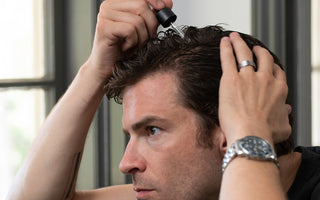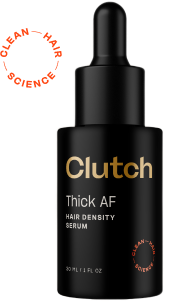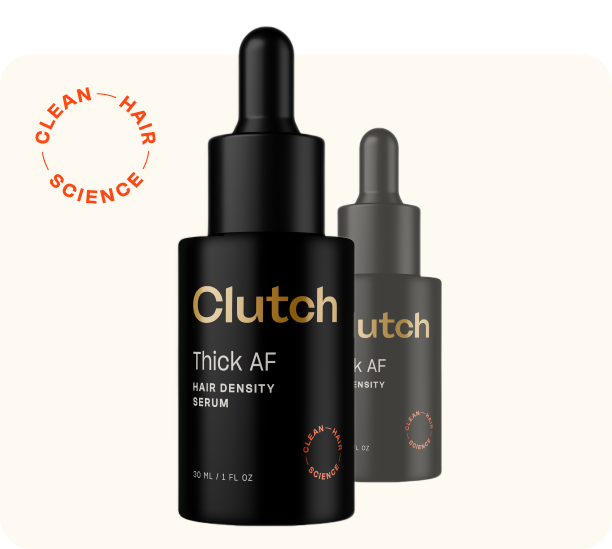So you want thick, healthy hair, and you want it now. Well, first, the bad news: Even in a perfect world, growing your mane takes a lot of time and patience. Unless you’re wearing a hairpiece or going for a hair transplant, a full head of hair just doesn’t happen overnight. But don’t let that little fact get you down because the good news is, there are practical steps you can take if you’re wondering how to fix stunted hair growth and speed up the process of growing your locks. Below, we list down five research-backed tips on how to grow hair faster for men.
How Fast Does Hair Grow?
Your mane grows at a steady pace, clocking in at an average of about half an inch per month. That may not sound like a lot, but that eventually adds up to an impressive six inches a year.
Hair is produced by the millions of hair follicles all over your body, and about 100,000 of them are found on your scalp. A normal hair growth cycle is divided into four phases, which are:
- Anagen (Growth) Phase – The hair follicle produces a strand and grows it to its full length. This active growth phase lasts for years, typically between three to 10.
- Catagen (Transition) Phase – Hair growth begins to slow down and strands gradually detach from the base of the follicles during the transition phase that lasts for two to three weeks.
- Telogen (Resting) Phase – The resting phase can take three to four months, during which time hair growth is completely halted. At the same time, new strands begin to form in the follicles that have just been freed during the catagen phase.
- Exogen (Shedding) Phase - The shedding period is sometimes considered to be the second part of the telogen phase. During this time, hair falls off the scalp at an average of 100 to 150 strands per day before eventually being replaced by new hair.
What’s interesting is that although your hair follows the same hair growth cycle, each strand has its own timeline and grows at its own pace. Meaning, not all your hair will be on the same phase of the cycle at the same time (which is perfect because you wouldn’t want all your hair to enter the shedding phase all at once).
What Factors Can Affect Hair Growth?
Genetics is one of the main players in one’s physiological development, and the same is true for hair growth. Your genes determine the rate at which your mane grows or how thick and full it will be. Other factors that can influence hair growth are:- diet and nutrition
- lifestyle and stress levels
- medications and underlying health conditions
- hair type
- age and hormone changes
5 Tried-and-Tested Tips to Grow Hair Faster for Men
Fixing stunted hair growth requires a two-pronged approach: improving and maintaining the health of the hair you have and encouraging the growth of strong and healthy hair. Let these evidence-based tips guide you on how to grow hair faster for men.
1. Massage Your Scalp
A scalp massage may be the simplest tip you’ll find in this list, but it’s one of those things that hair experts swear by. According to research, giving your scalp a proper rubdown not only induces a feeling of relaxation but also increases blood flow and stimulates the dermal papilla cells found at the hair follicle’s base. And you’ll definitely want these specialized cells stimulated because they play essential roles in hair formation, growth, and cycle.
2. Improve Your Diet
Eating a well-balanced diet is a life essential and something that we’re often happy to “forget” to do. But next time you try to push those leafy greens aside, consider this: the lack of certain nutrients may cause your hair to become dry and brittle and can contribute to thinning and shedding.
Add more hair-friendly options to your everyday fare. Fatty fish are a great source of omega-3, which is believed to improve hair density. Foods rich in iron, protein, vitamin E, and antioxidants are also a must.

3. Look Into Supplements (and Treatments)
If you’re genetically susceptible to male pattern hair loss, you may need more help to keep that hairline from receding further. That’s where supplements (and an appointment with a healthcare professional) come in.
While more evidence is needed before we can unanimously declare these supplement ingredients as hair growth MVPs, a handful of studies do hint that biotin, hyaluronic acid, and collagen can give your hair a nudge towards growing healthier and faster.
On the other hand, FDA-approved prescription medications like finasteride and topical minoxidil both have strong scientific cred to support their claims of stemming DHT-related hair loss and promoting faster hair growth—but not without a catch, as both also come with their fair share of sketchy side effects.
If you’d rather skip prescriptions and go the safer route instead, then start by taking your hair care products to the next level. That means knowing exactly which ingredients can work for your hair and which ones will do your tresses and body more harm than good.
So what ingredients would you want on your corner? Antioxidants like green tea and caffeine, vitamin E, biotin, keratin, and nourishing oils and extracts like argan, peppermint, coconut, and saw palmetto oils
4. Sleep More, Stress Less
Stress has been associated with hair loss conditions like alopecia areata and telogen effluvium. It can disrupt the growth cycle and force the hair follicles to enter the resting phase prematurely.
One way to keep stress levels down is by getting enough sleep every night and allowing your mind and body to rest. Sleep also signals your body to start its recovery process. During this time, cells begin to repair and reproduce at a faster rate, which can then help speed up hair growth.
5. Be Gentle
When trying to grow hair faster, the last thing you want is to damage the hair you already have and cause hair fall. Make sure to style or brush your hair as gently as possible—no tugging, twisting, or pulling. Ditch the heat tools, harsh chemical treatments, and tight hairstyles as much as possible.






